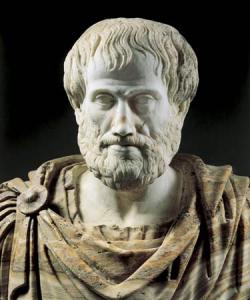To more fully elucidate the problem of world, whether it does or does not depend on an observer, we introduce two quotations from Aristotle. First:
[Animals] have sense-perception, and this is a kind of knowledge. If we consider the value of this we find that it is of great importance compared with the class of lifeless things…[B]eside absolute insensibility, [even the barest perception] seems most excellent, for it would seem a treasure to gain even this kind of knowledge rather than to lie in a state of death and nonexistence (Generation of Animals 731a 33 – 731b 4).
If “the class of lifeless things” lies “in a state of death and nonexistence,” as Aristotle says here, then a zombie universe, in which life never evolved and which therefore would include nothing but lifeless things, would itself lie in a state of nonexistence. But haven’t we said that nonexistence cannot be? How can anything exist in a state of nonexistence? Isn’t that a contradiction in terms? By no means. Consider the second quotation:
[I]f only what is sensible exists, there would be nothing if animate things were not; for there would be no faculty of sense. Now the view that neither the sensible qualities nor the sensations would exist is doubtless true (for they are affections of the perceiver), but that the substrata which cause the sensation should not exist even apart from sensation is impossible…[T]here is something beyond the sensation, which must be prior to the sensation; for that which moves [i.e., a mover which moves something else] is prior in nature to that which is moved (Metaphysics 1010b 30 – 1011a 1).
Since the mover is prior to the moved, and since the substrata move the senses to perceive, there must be something other than and prior to the perceptions, viz. whatever is moving them. Now, if it is true that the physical substratum must exist prior to and independently of the perceptions, those who argue, as some did in ancient Greece, that only perceptions exist are wrong. In that case, the world would not be a world of appearances. Yet Aristotle himself, in the first quotation, says that things that do not perceive (which he calls “lifeless things”) remain in a state of nonexistence. We again ask: How can anything exist in a lifeless universe if, according to Aristotle, everything is in a state of nonexistence?
If we take Aristotle at his word in the first quotation, existence would require an observer. But he says something quite different in the second quotation. Either we must accuse Aristotle of contradicting himself or we must recognize that he is simply using the concept of existence in two different senses, roughly corresponding to the difference between Heidegger’s terms “existence” and “extantness” in Being and Time. It is not the extantness but the existence of the universe that demands an observer. Since brute matter does not perceive, it also has no there in which anything can be — i.e., it remains in oblivion. It just means that nothing is there for anyone since there isn’t even a self for whom things can be. (Of course, if God exists and is omniscient, then we have an eternal observer. Only in that sense can things always be there.)
Without an observer, nothing exists. But what is meant by “exists” here can only be understood if we try to think how nothing is there for brute matter. But that is hard to do because, as Bergson found out in his little thought experiment about nothingness, our own consciousness always gets in the way, lending existence to what otherwise wouldn’t be there, either for itself or for another.
Of course, because we are observers, because observers currently exist, we observe that the physical universe would still “be there” without us. On the other hand, things really would not be there since there would be no there in which they could be. The there is supplied by perception and therefore requires an observer. The problem is that naturalistic thinking thinks that the there is something like physical space, but in fact the latter has no there at all. Space is not the there. The there is rather the clearing in which space itself makes its appearance.
All this may sound like hair-splitting, but it is a confusion that has plagued human thinking for millennia. We already see the confusion in the quotations from Aristotle above, particularly in the ambiguousness of the concept of existence and the way it is equivocally used.


